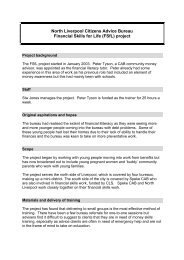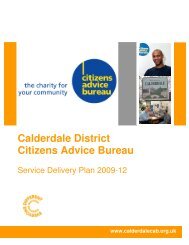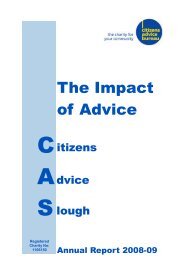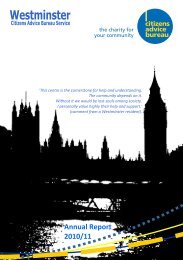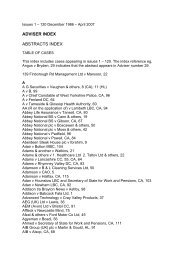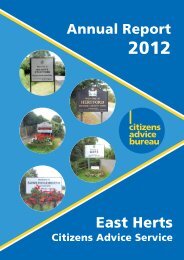Sign up for advice - Citizens Advice
Sign up for advice - Citizens Advice
Sign up for advice - Citizens Advice
Create successful ePaper yourself
Turn your PDF publications into a flip-book with our unique Google optimized e-Paper software.
the<br />
News from across the <strong>Citizens</strong> <strong>Advice</strong> service<br />
Summer<br />
2010<br />
<strong>Sign</strong> <strong>up</strong> <strong>for</strong> <strong>advice</strong><br />
Hard times,<br />
strong society<br />
Our 70th anniversary debate<br />
Local campaigns<br />
Bureaux make a difference
welcome<br />
Contents<br />
News and events 3<br />
Stakeholder debate 4-5<br />
Partnership working 6-7<br />
Across the service 8-9<br />
Financial inclusion 10-11<br />
Did you know 12<br />
Editorial<br />
The Citizen is a quarterly<br />
newsletter bringing you all<br />
the news from the <strong>Citizens</strong><br />
<strong>Advice</strong> service.<br />
A bilingual version (Welsh /<br />
English), called Cyngor, will<br />
be available online at<br />
citizens<strong>advice</strong>.org.uk<br />
Produced by <strong>Citizens</strong> <strong>Advice</strong><br />
Myddelton House<br />
115–123 Pentonville Road<br />
London N1 9LZ<br />
Tel: 020 7833 2181<br />
<strong>advice</strong>guide.org.uk<br />
citizens<strong>advice</strong>.org.uk<br />
Foreword<br />
Welcome to the summer issue of The Citizen.<br />
Hard times, strong society was the title of a high<br />
level debate, organised by <strong>Citizens</strong> <strong>Advice</strong> in the<br />
run <strong>up</strong> to the General Election. Hosted as part of<br />
our 70th celebrations, the event was a great success<br />
and you can read about it on pages four and five.<br />
This summer issue focuses on some of the excellent<br />
campaign work that bureaux have been doing to<br />
challenge unfair practices and improve the lives of<br />
the millions of people who need us most.<br />
The extended funding <strong>for</strong> our award winning<br />
partnership with The Royal British Legion, The Royal<br />
Air Force Benevolent Fund and <strong>Citizens</strong> <strong>Advice</strong><br />
Northern Ireland means we can continue to help<br />
the men and women who have served their country,<br />
live their lives free from financial distress.<br />
As well as finding out more about our innovative<br />
partnership with the Association of British Credit<br />
Unions to tackle financial exclusion, you can read<br />
about our volunteers’ reception, held at St James’s<br />
Palace, London.<br />
<strong>Citizens</strong> <strong>Advice</strong> has launched its first ever web<br />
pages dedicated to giving <strong>advice</strong> in British <strong>Sign</strong><br />
Language. Rosanna Mazzocchio (front cover),<br />
Marcella Stratton and Ernesto del Carpio are the<br />
profoundly deaf CAB volunteers who feature in the<br />
videos.<br />
I hope you enjoy this edition.<br />
John Gladwin<br />
Chair, <strong>Citizens</strong> <strong>Advice</strong><br />
For more copies of The Citizen or to receive an e-version of this newsletter,<br />
please send your contact details to thecitizen@citizens<strong>advice</strong>.org.uk<br />
Do you have a <strong>Citizens</strong> <strong>Advice</strong> story you would like to share Send<br />
your news stories to Sally Littlecott at thecitizen@citizens<strong>advice</strong>.org.uk<br />
2 the Citizen summer 2010
news<br />
Volunteers meet HRH The Princess Royal at St James’s Palace<br />
Volunteer reception<br />
As part of our 70th anniversary celebrations, a<br />
Volunteers’ Reception was held at St James’s Palace,<br />
London. HRH The Princess Royal, David Harker<br />
and John Gladwin hosted the event, to publicly<br />
acknowledge and thank the many thousands of<br />
volunteers who have given their time freely over the<br />
past 70 years.<br />
In total, 100 volunteers were selected at random to<br />
represent the 21,500 volunteers the <strong>Citizens</strong> <strong>Advice</strong><br />
service depends on to provide accessible, quality<br />
driven <strong>advice</strong> in 3,500 locations across England<br />
and Wales. Put simply, without our volunteers the<br />
service would not be able to respond to the needs<br />
and demands of the millions of people who contact<br />
us every year.<br />
In her opening address, HRH The Princess Royal<br />
highlighted the impact that volunteering has on<br />
the health of a community; raising aspirations,<br />
encouraging community participation and leading<br />
to strong, active and empowered communities.<br />
“Without you, the service would never<br />
have survived to be the excellent, valued<br />
organisation it is today.”<br />
HRH The Princess Royal, Patron of <strong>Citizens</strong><br />
<strong>Advice</strong><br />
the Citizen summer 2010 3
stakeholder debate<br />
Hard times,<br />
strong society<br />
As part of our 70th anniversary<br />
celebrations, and in the run-<strong>up</strong> to<br />
the General Election, <strong>Citizens</strong> <strong>Advice</strong><br />
gathered leading players in public<br />
policy to tackle the key political issues facing<br />
our clients during an evening debate at the QE2<br />
Conference Centre in Westminster.<br />
The prestigious panel chaired by BBC News<br />
chief political correspondent, Laura Kuenssberg,<br />
included:<br />
• Rt Hon Yvette Cooper MP, the then Secretary of<br />
State <strong>for</strong> Work and Pensions<br />
• Francis Maude MP, the then Shadow Chancellor<br />
of the Duchy of Lancaster<br />
• Vince Cable MP, the then Deputy Leader and<br />
Shadow Chancellor, Liberal Democrats<br />
• Richard Reeves, Director of Demos<br />
• Guardian columnist Polly Toynbee.<br />
The debate kicked off with an assessment of what<br />
impact the recession has had on <strong>Citizens</strong> <strong>Advice</strong><br />
clients. Yvette Cooper noted that unemployment<br />
had been lower than predicted, thanks to<br />
government s<strong>up</strong>port and employers making hard<br />
decisions. Francis Maude cautioned that although<br />
still in work, many people were now working on<br />
short term contracts and many others had taken<br />
significant cuts in pay. Polly Toynbee drew the<br />
audience’s attention to the inequality of the impact<br />
of the recession, highlighting how it is often the<br />
same people who get hit time and again. This<br />
prompted Vince Cable to express unease about<br />
what will happen once temporary government<br />
protections are removed later in the year.<br />
The discussion moved on to what new roles the<br />
recession had created <strong>for</strong> organisations like <strong>Citizens</strong><br />
<strong>Advice</strong>. Yvette Cooper argued that the voluntary<br />
sector’s role needs to expand to take advantage<br />
of the different skills and experience it brings.<br />
There was concern from Richard Reeves that<br />
government’s insistence on central state control<br />
could make this difficult.<br />
Francis Maude was determined that these<br />
difficulties must be overcome, stating the voluntary<br />
sector has a big part to play in providing essential<br />
frontline services. He added that in a healthy<br />
economy, services are provided by a mix of public,<br />
private and voluntary sector organisations selected<br />
<strong>for</strong> their ability to do the job and their readiness to<br />
be appraised on cost, quality and value.<br />
Talk of mixed service provision naturally raised the<br />
question of accountability. If the government is<br />
to engage the voluntary sector in providing more<br />
and more public services, who can the tax payer<br />
hold to account if it fails Francis Maude was clear<br />
that accountability is not the preserve of national<br />
government:<br />
“That’s where the accountability of front<br />
line services should be – with people, service<br />
users not central government.”<br />
4 the Citizen summer 2010
stakeholder debate<br />
“It’s very hard to find government ministers who wouldn’t actually want to find<br />
organisations like <strong>Citizens</strong> <strong>Advice</strong> and others doing more, to be bigger and to be even<br />
more effective precisely because they are providing such a vital service.”<br />
Richard Reeves, Director, Demos<br />
Laura Kuenssberg Richard Reeves Yvette Cooper Vince Cable Francis Maude Polly Toynbee<br />
On the subject of whether spending on such<br />
services should be cut, Yvette Cooper was clear<br />
that frontline services needed to be protected<br />
and sustained <strong>for</strong> the future. Francis Maude went<br />
further and warned against soft-target cuts such as<br />
ending grants to voluntary organisations, instead<br />
advocating <strong>for</strong> efficiency savings.<br />
When asked specifically about CAB funding in light<br />
of spending cuts, the panel agreed that continued<br />
funding of the <strong>Citizens</strong> <strong>Advice</strong> service is essential.<br />
Yvette Cooper insisted that what the service does<br />
with its thousands of volunteers could not be<br />
replicated, and explained:<br />
“It’s that added value... that helps prevent<br />
a lot of problems, by giving people <strong>advice</strong><br />
early that ultimately saves money later on.”<br />
Vince Cable proposed that areas of <strong>advice</strong> with<br />
identifiable unmet need could be funded by the<br />
relevant industries; the finance industry funding<br />
the provision of financial <strong>advice</strong>, <strong>for</strong> example.<br />
Francis Maude agreed, recognising that the finance<br />
industry benefits from a better-advised customer<br />
base.<br />
Months ahead of the recent government<br />
announcement to engage more citizens in the<br />
Comprehensive Spending Review, the panel was<br />
in favour of engaging citizens in managing any<br />
cutbacks. Vince Cable argued the importance of<br />
canvassing opinion across the country in the same<br />
way that Canada had done.<br />
Richard Reeves pointed out that, <strong>for</strong> public<br />
involvement to be genuine, a certain level of trust<br />
is required, which Francis Maude suggested could<br />
be achieved through greater transparency. He<br />
highlighted, as a starting point, the Conservative<br />
commitment to publishing details of public<br />
spending which exceeds £25,000.<br />
The question of public trust was also touched on<br />
in relation to frontline services. When the role of<br />
new technology was discussed, Vince Cable was<br />
clear that we need to be innovative in its use, but<br />
what people in financial difficulty want most is<br />
face-to-face human contact. Given that the <strong>Citizens</strong><br />
<strong>Advice</strong> service has three times as many face-to-face<br />
contacts with clients as it does phone or written<br />
contacts, it is ideally placed to deliver exactly that.<br />
the Citizen summer 2010 5
partnership working<br />
Combating money<br />
problems<br />
“I cannot compliment you enough on a<br />
personal level <strong>for</strong> helping me through what<br />
was a most difficult and stressful period of<br />
my life – thank you.”<br />
Client, Cornwall CAB<br />
The Benefits and Money <strong>Advice</strong> Service<br />
(BMAS) is celebrating being awarded the<br />
Best Partnership award from the Institute<br />
of Money Advisers (IMA).<br />
Delivered as part of The Royal British Legion’s Poppy<br />
S<strong>up</strong>port scheme, BMAS is a partnership between<br />
<strong>Citizens</strong> <strong>Advice</strong>, the Legion, the Royal Air Force<br />
Benevolent Fund (RAFBF) and <strong>Citizens</strong> <strong>Advice</strong><br />
Northern Ireland. It provides specialist benefits and<br />
money <strong>advice</strong> in bureaux <strong>for</strong> existing and <strong>for</strong>mer<br />
servicemen and women and their dependants.<br />
Funded by the Legion and RAFBF, there are 43<br />
full-time equivalent caseworkers based in 38<br />
bureaux across the country.<br />
The award winning project was set <strong>up</strong> in October<br />
2007 and has, so far, helped 12,000 people with<br />
financial outcomes worth over £32.7 million.<br />
During 2009/10, clients were helped to claim nearly<br />
£4.7 million in unclaimed benefits.<br />
Carlisle CAB helped a <strong>for</strong>mer soldier who had<br />
retired due to ill health claim disability and carer<br />
benefits worth over £12,000 a year.<br />
Richmondshire CAB assisted a serving soldier, who<br />
is divorced with a child and is four months<br />
pregnant, claim tax credits and child benefit of over<br />
£8,000 per year.<br />
During the same period, debts worth £13.7 million<br />
were written off and £1.8 million other gains,<br />
including grants from the Legion’s Poppy Funds<br />
scheme. As well as grants, clients can benefit from a<br />
wide range of other help from the Poppy S<strong>up</strong>port<br />
scheme, including short and long-term care, travel,<br />
and household repairs to help elderly veterans<br />
remain independent in their own homes.<br />
Middlesbrough CAB helped a 35 year old client<br />
with multiple debts of over £74,000. Claiming<br />
benefits increased their income by £6,760 per year,<br />
meaning his partner could give <strong>up</strong> her part-time job<br />
to care <strong>for</strong> their disabled son. Successfully applying<br />
<strong>for</strong> bankr<strong>up</strong>tcy gave the client a fresh start and<br />
financial stability.<br />
North Liverpool CAB helped a 74 year old client in<br />
poor health and with multiple debts totalling nearly<br />
£11,000. As well as successfully applying <strong>for</strong> a debt<br />
relief order which wrote the debts off, the adviser<br />
helped him with benefit claims increasing his annual<br />
income by £7,000 per year plus £2,300 in housing<br />
and council tax benefit.<br />
It’s not just about maximising incomes and<br />
negotiating with creditors, BMAS caseworkers work<br />
closely with other organisations such as Age UK,<br />
Shelter and Combat Stress, to ensure a specialist<br />
and holistic service is provided: Leatherhead and<br />
Dorking CAB helped a client who had been<br />
diagnosed with mesothelioma, as a result of being<br />
exposed to asbestos, claim compensation of<br />
£11,505 as well as helping him with a claim <strong>for</strong><br />
industrial injuries disablement benefit.<br />
A client suffering with dementia had recently signed<br />
<strong>up</strong> to a credit agreement to purchase solar panels<br />
<strong>for</strong> his property, at a cost of £6,000. Cornwall CAB<br />
successfully terminated the contract due to the<br />
client’s lack of mental capacity and got his deposit of<br />
£1,500 returned to him.<br />
During 2009/10 the average number of issues<br />
BMAS advisers helped each client with was 5.1,<br />
compared to 3.4 <strong>for</strong> the <strong>Citizens</strong> <strong>Advice</strong> service<br />
overall. The complexity of cases means over four<br />
times as many contacts needed to be made with<br />
third parties to resolve clients’ problems, in<br />
comparison to the service as a whole.<br />
6 the Citizen summer 2010
partnership working<br />
Caseworkers at Richmondshire CAB Award-winning Paul Parkin Collecting the IMA award<br />
This complexity is demonstrated by Plymouth CAB<br />
where 22 separate letters have been written on<br />
behalf of a client with post traumatic stress disorder<br />
covering issues which included benefits, debt and<br />
housing issues.<br />
As well as referrals, bureaux have been proactive in<br />
establishing good relations with local service bases<br />
to raise awareness of the project. Rushmoor CAB<br />
runs a successful clinic at Pirbright barracks and<br />
hopes to extend the service to other local bases. A<br />
talk to soldiers due to be medically discharged has<br />
increased the numbers seeking <strong>advice</strong> on benefits.<br />
Exeter CAB has recently resumed its monthly clinic<br />
at the Commando Training Centre <strong>for</strong> Royal<br />
Marines at Lympstone which includes <strong>for</strong>tnightly<br />
presentations of the project to new recruits.<br />
West Ox<strong>for</strong>dshire CAB successfully convinced<br />
local service bases and garrisons that financial<br />
capability sessions should be an integral part of their<br />
induction process. These preventative sessions,<br />
covering things like budgeting and managing your<br />
finances, have had very positive responses and will<br />
hopefully mean that participants are less likely to<br />
become the debt clients of the future.<br />
Nominated by local people, Slea<strong>for</strong>d CAB was<br />
delighted to win the customer service award <strong>for</strong> its<br />
professional and effective service. Paul Parkin, one<br />
of the BMAS caseworkers, was singled out <strong>for</strong><br />
particular praise <strong>for</strong> his customer care and attention.<br />
As part of the project, <strong>Advice</strong>guide has launched<br />
new pages <strong>for</strong> serving members of the Armed<br />
Forces and their families on finances, health,<br />
pensions and housing at:<br />
www.<strong>advice</strong>guide.org.uk<br />
“I did not know where to turn as no one else<br />
would deal with my issues.”<br />
Client, Richmondshire CAB<br />
“After a lot of worry about finances, just<br />
after the first meeting, a weight was taken<br />
off our shoulders.”<br />
Client, Scarborough CAB<br />
> CASE STUDIES<br />
Discharged from the Royal Navy on medical<br />
grounds, the client, in his 30s, was being<br />
evicted as his landlord was selling the flat. He<br />
was struggling to manage on statutory sick<br />
pay and a small service pension. The adviser<br />
at Dorchester CAB successfully applied <strong>for</strong><br />
benefits and extra war pension amounting to<br />
over £12,500 per year, as well as getting the<br />
holiday pay and bonuses due to him. Best of<br />
all, he was given the tenancy of a ground floor<br />
flat with adapted facilities to assist with his<br />
disabilities.<br />
At Denbighshire CAB, the client, ex RAF, was<br />
suffering with dementia. His wife was physically<br />
disabled and frail. By claiming attendance<br />
allowance and related additions, their annual<br />
income was increased by over £16,000.<br />
After intense negotiation, the client’s debts,<br />
amounting to nearly £20,000 to five different<br />
creditors were successfully written off.<br />
the Citizen summer 2010 7
across the service<br />
Local campaigns<br />
<strong>for</strong> local people<br />
As well as providing the <strong>advice</strong> people<br />
need <strong>for</strong> the problems they face, the<br />
<strong>Citizens</strong> <strong>Advice</strong> service’s twin aim is to<br />
improve the policies and practices that<br />
affect people’s lives.<br />
Having dealt with 7.1 million issues during 2009/10,<br />
we are ideally placed to identify areas that are<br />
adversely affecting our clients and use this evidence<br />
to prevent other people experiencing the same<br />
problems. From successfully lobbying <strong>for</strong> tough new<br />
measures to en<strong>for</strong>ce the payment of Employment<br />
Tribunal awards to highlighting best practice on<br />
reducing the hidden costs of education, our clients’<br />
experience is invaluable to campaign <strong>for</strong> change.<br />
Firmly rooted in their local communities, bureaux<br />
see the effects unfair practices have on their clients<br />
every day, as well as the hardship and distress they<br />
cause. Collecting examples of these can be the first<br />
step towards improving the lives of hundreds of<br />
thousands of people, especially where a local issue<br />
has a much wider national implication.<br />
The Hung <strong>up</strong> campaign highlighted the cost of<br />
calling government phone lines from a mobile<br />
phone. Finding that half of their clients did not<br />
have a landline, Leeds CAB gathered evidence<br />
from 70 bureaux across the North of England,<br />
showing many people on low incomes struggled<br />
to af<strong>for</strong>d to contact government about benefits<br />
and tax credits. They published the Hung <strong>up</strong> report<br />
in June 2009 and worked with the media, MPs<br />
and civil servants to press <strong>for</strong> changes. In January<br />
2010, the Department <strong>for</strong> Work and Pensions<br />
(DWP) announced that most of their 0800 numbers<br />
would be free to mobile phone users, thanks to<br />
an agreement with the six biggest mobile phone<br />
operators. It is estimated that this will help nine<br />
million people.<br />
Bureau experience with vulnerable clients affected<br />
by bailiffs’ poor practice led <strong>Citizens</strong> <strong>Advice</strong> and<br />
the Local Government Association (LGA) to launch<br />
a joint good practice protocol <strong>for</strong> bureaux to use<br />
with local authorities to improve collection of<br />
council tax debts. Bath and North East Somerset<br />
District Council found that using the protocol<br />
can help boost collection rates by adopting a<br />
more realistic and flexible approach, something<br />
Bath CAB has raised during their regular threeway<br />
meetings. Bureaux have reported much<br />
improved communications with local authorities<br />
enabling them to achieve significant outcomes<br />
<strong>for</strong> vulnerable and struggling clients. Bureaux in<br />
Northumberland are now being consulted by the<br />
council as part of a tendering exercise to select new<br />
bailiffs.<br />
As well as influencing local and national decision<br />
makers, one of the strengths of bureaux is in<br />
campaigning to improve access to essential services<br />
in their communities.<br />
With no Jobcentre in Bishops Stort<strong>for</strong>d, East<br />
Hert<strong>for</strong>dshire CAB saw first hand the problems<br />
clients were having, travelling long distances<br />
to Harlow or Hert<strong>for</strong>d. Working with the local<br />
newspaper, the YMCA and Kickstart, the bureau<br />
joined in the petition to bring the Jobcentre back<br />
with the s<strong>up</strong>port of their local MP. Altogether over<br />
1,000 signatures were collected and in March this<br />
year, Jobcentre Plus agreed to provide an outreach<br />
service in the town three days a week.<br />
Bringing examples of unfair practice and poor<br />
customer service to the attention of the companies<br />
involved, can lead to improved communication and<br />
liaison, which paves the way <strong>for</strong> resolving future<br />
issues quickly and efficiently.<br />
8 the Citizen summer 2010
across the service<br />
Leeds CAB collecting awards <strong>for</strong> its Hung <strong>up</strong> campaign<br />
Identifying a local Housing Association’s poor<br />
customer service, repair and complaints procedures<br />
as a major issue <strong>for</strong> tenants, Camden CAB collated<br />
evidence from the previous 12 months to present to<br />
the Housing Association. This resulted in the bureau<br />
being asked to join a working party to review and<br />
improve procedures and to provide feedback on<br />
future tenant experiences.<br />
Melton CAB collected evidence from 200 clients<br />
on unfair practices used by energy s<strong>up</strong>pliers<br />
including excessive bills and poor customer service.<br />
The consequent report was sent to the six big<br />
energy s<strong>up</strong>pliers who all recognised that customer<br />
services needed improving and were keen to redress<br />
any mistakes that were brought to their attention.<br />
Sometimes the evidence bureaux uncover<br />
necessitates further investigation. After numerous<br />
complaints, evidence of clamping infringements<br />
collated by Derby <strong>Citizens</strong> <strong>Advice</strong> and Law<br />
Centre (CALC) was passed to the Security Industry<br />
Authority (SIA). As a result, the Director of the<br />
company is being prosecuted by Derbyshire<br />
Constabulary <strong>for</strong> working without a SIA licence.<br />
Few changes in policy happen overnight and even<br />
when legislation has been introduced to right a<br />
wrong, bureaux continue to monitor its effect<br />
on clients. Three years after the Tenancy Deposit<br />
Protection legislation was implemented, bureaux<br />
continue to raise tenants’ awareness of the<br />
scheme to make sure they do not get conned by<br />
unscr<strong>up</strong>ulous landlords and agents.<br />
<strong>Citizens</strong> <strong>Advice</strong> collates the evidence collected by<br />
bureaux and uses this to work with other partners<br />
to address common issues at a national level. A year<br />
long joint campaign with Crisis, Shelter and the<br />
Chartered Institute of Housing culminated in the<br />
Mortgage Repossessions (Protection of Tenants)<br />
Act becoming law on 8 April. The campaign was<br />
calling <strong>for</strong> protection <strong>for</strong> tenants evicted, with little<br />
or no notice, when landlords default on mortgage<br />
repayments. Bureaux collected evidence from over<br />
1,000 clients and wrote to their local MPs asking<br />
them to s<strong>up</strong>port the Early Day Motion, resulting in<br />
150 signatures being collected.<br />
Our current campaigns are focusing on clients’<br />
experiences of back-to-work s<strong>up</strong>port and the work<br />
capability assessment <strong>for</strong> employment and s<strong>up</strong>port<br />
allowance.<br />
With welfare re<strong>for</strong>m being a hot topic <strong>for</strong> the new<br />
Government, the evidence from bureaux should<br />
prove both timely and invaluable.<br />
the Citizen summer 2010 9
financial inclusion<br />
Connect<br />
to tackle<br />
financial exclusion<br />
With around 7.8 million people in the<br />
UK unable to access mainstream<br />
credit and increasing levels of<br />
personal debt – during 2009/10 the<br />
<strong>Citizens</strong> <strong>Advice</strong> service dealt with 2.4 million debt<br />
enquiries – financial exclusion continues to be a<br />
major issue.<br />
To tackle this, <strong>Citizens</strong> <strong>Advice</strong> has joined <strong>for</strong>ces<br />
with the Association of British Credit Unions<br />
Ltd (ABCUL) to encourage bureaux and credit<br />
unions to develop sustainable local partnerships.<br />
By working together, the partnerships are able<br />
to offer better and more joined <strong>up</strong> services to<br />
people who are financially excluded.<br />
The Connect project, funded by Barclays<br />
Bank plc and s<strong>up</strong>ported by grants from the<br />
Abbey Charitable Trust, has just awarded small<br />
bursaries to 15 new partnerships. This Small<br />
Bursaries scheme has had a huge response with<br />
over 80 credit unions and bureaux completing<br />
applications. The 15 awards will be able to kick<br />
start or further develop sustainable working<br />
partnerships with a wide variety of initiatives.<br />
The Connect 1 project s<strong>up</strong>ported a total of 12<br />
applications to create new partnerships or build<br />
on existing ones. Using a variety of models, the<br />
project developed a toolkit to establish good<br />
practice.<br />
As well as learning more about each other’s<br />
services, partnerships were able to develop<br />
joint referral schemes and, in some places, joint<br />
services.<br />
Caerphilly County CAB and Caerphilly Credit<br />
Union set <strong>up</strong> a rent clinic with their local Housing<br />
Association to help first time defaulters get back<br />
on track.<br />
10 the Citizen summer 2010<br />
© <strong>Citizens</strong> <strong>Advice</strong>/ABCUL 2008<br />
In a predominantly rural area, Caledfryn Credit<br />
Union and Denbigh CAB hired a bus during<br />
<strong>Advice</strong> Week, making direct contact with over<br />
1,000 people.<br />
Credit unions and bureaux are ideally placed to<br />
work together to tackle financial exclusion. Both<br />
are community based, offering local services and<br />
have an ethos of helping people with their rights<br />
and responsibilities.<br />
In addition to free debt <strong>advice</strong>, over 200 bureaux<br />
across England and Wales work with a variety of<br />
partners to deliver financial capability training to<br />
help people manage their finances and budget<br />
effectively.<br />
With over 800,000 people using their services,<br />
credit unions offer a range of accessible financial<br />
services, including af<strong>for</strong>dable credit. As well as<br />
encouraging a savings culture, they help people<br />
develop the skills, knowledge and confidence to<br />
make in<strong>for</strong>med decisions about their personal<br />
finances.
financial inclusion<br />
> CASE STUDY<br />
© <strong>Citizens</strong> <strong>Advice</strong>/ABCUL 2008<br />
Lesley Powell (Manager, Denbigh CAB with Ann<br />
Francis (Manager, Caledfryn Credit Union)<br />
Bolton CAB referred a client to<br />
Quids In Bolton Credit Union.<br />
A significant proportion of<br />
his wages were taken <strong>up</strong> by<br />
repaying a credit debt which<br />
would have taken nearly ten<br />
years to pay off.<br />
Accepted <strong>for</strong> a credit union<br />
loan, the debt will now be<br />
repaid within three years <strong>for</strong> the<br />
same monthly repayment.<br />
Without access to basic financial services, people<br />
become reliant on alternative <strong>for</strong>ms of credit such as<br />
doorstep lenders, pawnbrokers and cheque cashing<br />
shops.<br />
Those who can least af<strong>for</strong>d it end <strong>up</strong> paying a<br />
“poverty premium”, paying higher charges <strong>for</strong> basic<br />
services. Estimated figures show that this can cost<br />
people around £1,000 a year, leading to further<br />
indebtedness and continued financial exclusion.<br />
Credit unions are able to offer members af<strong>for</strong>dable<br />
credit and always consider the member’s personal<br />
circumstances alongside their ability to repay.<br />
Borrowing £300 over six months from a doorstep<br />
lender could cost a massive £200 in interest<br />
charges, compared to a maximum of £22 <strong>for</strong> a<br />
credit union loan.<br />
The partnership means that members who are<br />
struggling with their finances are encouraged to<br />
seek <strong>advice</strong> from their local bureau rather than<br />
borrowing more money. It can also increase people’s<br />
income by ensuring they are claiming all the<br />
benefits they are entitled to.<br />
> CASE STUDY<br />
A client is getting debt<br />
<strong>advice</strong> from the bureau and<br />
budgeting assistance from the<br />
credit union.<br />
As payments fall due or new<br />
arrangements are made with<br />
creditors, he takes the budget<br />
sheet that the bureau drew<br />
<strong>up</strong> <strong>for</strong> him to the credit union<br />
who arrange <strong>for</strong> the cheques<br />
to be sent off.<br />
This ensures the long-term<br />
effectiveness of the debt<br />
<strong>advice</strong> given by the bureau<br />
and helps the client with<br />
budgeting skills.<br />
From a bureau’s point of view, they can give clients<br />
in<strong>for</strong>mation about local financial services which can<br />
help people access savings, af<strong>for</strong>dable credit and<br />
budgeting accounts <strong>for</strong> bill payments.<br />
For more in<strong>for</strong>mation, see<br />
http://creditunioncommunities.org<br />
the Citizen summer 2010 11
did you know<br />
Quarterly statistics<br />
(October – December 2009)<br />
In this quarter, we advised 620,000 clients on<br />
1.7 million new problems<br />
Percentage increases on the same period last year:<br />
Debt queries <strong>up</strong> 24%<br />
32% increase in fuel debts queries<br />
27% increase in rent arrears to private<br />
landlords<br />
30% increase in telephone debts<br />
Benefits/tax credits queries <strong>up</strong> 22%<br />
Enquiries were solved by:<br />
Giving the client in<strong>for</strong>mation or referral/<br />
signposting – 41%<br />
Further help and <strong>advice</strong> from advisers – 43%<br />
Ongoing casework – 16%<br />
In addition:<br />
Education <strong>advice</strong> – <strong>up</strong> 30%<br />
Financial products and services <strong>advice</strong> – <strong>up</strong> 25%<br />
Immigration and asylum <strong>advice</strong> – <strong>up</strong> 26%<br />
Health and community care – <strong>up</strong> 24%<br />
<strong>Sign</strong> <strong>up</strong> <strong>for</strong> <strong>advice</strong><br />
<strong>Citizens</strong> <strong>Advice</strong> has launched its first ever web pages<br />
dedicated to giving <strong>advice</strong> in British <strong>Sign</strong> Language<br />
(BSL) to help the 250,000 BSL users find a convenient<br />
way of accessing Citizen <strong>Advice</strong> services.<br />
Written and presented by deaf employee and<br />
volunteer CAB advisers, the five BSL films have been<br />
specially commissioned and designed <strong>for</strong> the deaf<br />
community.<br />
As well as an introductory film on how and where<br />
to get help at bureaux in England and Wales, the<br />
other four BSL films cover the most common queries<br />
bureaux deal with; debt, benefits, discrimination and<br />
employment – including discrimination at work.<br />
You can see the films at www.<strong>advice</strong>guide.org.uk/bsl<br />
or YouTube/<strong>Citizens</strong> <strong>Advice</strong>.<br />
On 17 May, staff from the Royal Association <strong>for</strong> Deaf<br />
People (RAD) and <strong>Citizens</strong> <strong>Advice</strong> took part in the<br />
London Legal sponsored walk raising over £1,600<br />
(so far) to fund webcams and other technology to<br />
improve deaf people’s access to <strong>advice</strong> at bureaux<br />
and law centres around England and Wales.<br />
Coming next issue:<br />
> Equality Act<br />
> Bureaux and local authorities facing the<br />
challenges together<br />
> An inside look at financial capability<br />
<strong>for</strong>ums<br />
<strong>Citizens</strong> <strong>Advice</strong> is an operating name of The National Association of <strong>Citizens</strong> <strong>Advice</strong> Bureaux.<br />
Registered charity number 279057


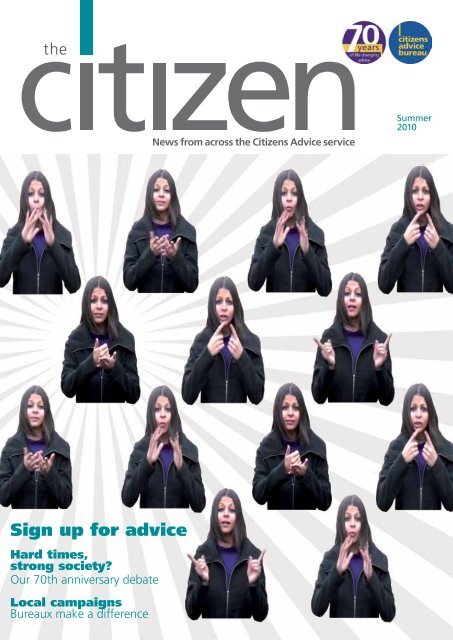
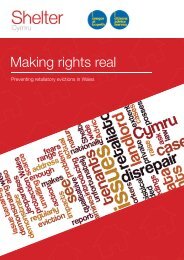

![Annual review [ 1.4 MB] - Citizens Advice](https://img.yumpu.com/50679529/1/190x135/annual-review-14-mb-citizens-advice.jpg?quality=85)

![Help for helping your residents [ 2.4 MB] - Citizens Advice](https://img.yumpu.com/48848542/1/185x260/help-for-helping-your-residents-24-mb-citizens-advice.jpg?quality=85)
